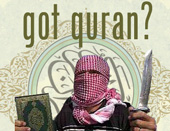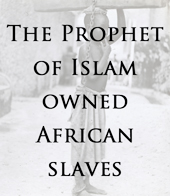TheReligionofPeace
|
|
TROP is a non-political, fact-based site which examines
the ideological threat that Islam poses to human dignity and freedom
|
|
|
Jihad Report
Jun 21, 2025 -
Jun 27, 2025
|
| Attacks |
31
|
| Killed |
106
|
| Injured |
169
|
| Suicide Blasts |
2
|
| Countries |
9
|
|

|
Jihad Report
May, 2025
|
| Attacks |
177
|
| Killed |
964
|
| Injured |
386
|
| Suicide Blasts |
3
|
| Countries |
17
|
|
List of Attacks
|
|
|
It's much easier to act as if critics of Islam have a problem with Muslims as people than
it is to accept the uncomfortable truth that Islam is different
|
|
|
|

|

|
|
|

What can we learn about
Islam from this woman?
|
|
|
|





